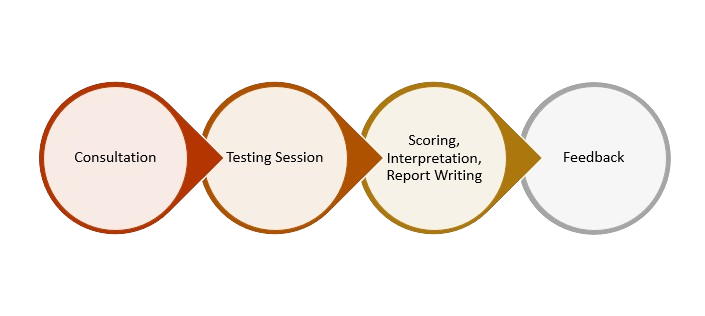Psychological Assessment
Psychological assessment is the process of evaluating an individual’s mental health and behavioral functioning through the use of standardized tests, observations, and other methods. It is typically conducted by a mental health professional, such as a psychologist or psychiatric nurse practitioner, and is used to diagnose mental health conditions, determine appropriate treatment options, and measure progress in treatment.
*The terms psychological “assessment,” “evaluation,” or “testing” are often used interchangeably.
What is psychological assessment?
Often times, primary care physicians or therapists may refer a client for a psychological assessment. Other times, you may be seeking answers yourself that you feel an assessment may clarify. Psychological assessments are often used to help diagnose a mental health condition, understand the severity of symptoms, monitor treatment progress, or for early intervention. Assessments can also measures one’s cognitive, academic, psychological, or behavioral functioning.
Why do I need an assessment?
Educational testing helps determine IQ, learning style, and aptitude. Such testing can often be useful in clarifying educational strengths and needs. This type of testing is often used in schools and helps to rule out or diagnose learning disabilities.
Cognitive testing is also a term often associated with measuring IQ. Measuring one’s IQ can help determine intellectual disabilities or giftedness. It can help identify problems with thinking, learning, remembering, and using language and judgment.
Neuropsychological testing helps clarify skills and abilities that we know to be specifically linked with certain brain functions. This can, but does not have to be, related to brain development, injuries, or medical irregularities. This kind of testing often looks at things like executive functioning (i.e., one’s ability to plan, organize, and inhibit cognitive, emotional, and behavioral responses), attention, memory, language development, visual-spatial skills, and even motor coordination and/or strength.
Developmental testing aims to identify and strengths or irregularities in ongoing development. This type of testing can clarify behaviors and brain capabilities as they align with what we know about developmental trends.
Psychological-type testing, more broadly, might be thought of as an effort to understand one’s mind and personality. In addition to several activities listed as part of the other types of testing, psychological assessment also aims to understand the emotional experiences, behaviors, and personality functions of an individual as they likely contribute clarity to the questions we are trying to answer.
Types of Testing
The evaluation takes place in four primary stages:
A consultation/interview is scheduled first. This is where we obtain your history, review concerns, discuss the reason for the evaluation, determine what testing needs to be done, and review informed consent and evaluation procedures. If there are self-report measures (i.e., things for you to fill out) or measures for others (e.g., teachers, family) needed, they will be sent with you. We ask they be returned in a timely manner to complete the evaluation. We also ask that you complete intake paperwork, which will be sent to you via the Client Portal, prior to this appointment.
After the consultation, we schedule the testing session(s). Typical testing sessions can range from 3.5 to 4 hours long, and may be scheduled into multiple sessions if needed. There are also times where we may need to schedule more than one testing session if there are many questions to answer. Other arrangements based on you or your child’s needs can be discussed and is generally determined during the consultation.
Scoring, interpretation, and report writing: This typically ranges from 3-9 hours in length. This is where the clinician looks at all the testing done and interprets what the results mean, resulting in a written report that is provided to you in the next step.
Feedback session (45-60 minutes) with you and/or child to provide interpretation about testing results, diagnostic impressions, and treatment recommendations after completion of the testing process.
What is the evaluation process like?
If you have remaining questions regarding psychological assessments, please click the button below for frequently asked questions. You may also call the office at 940-228-3803 or fill out the form on this page.
For questions or interest in scheduling, please fill out the form to the right. —->
This form sends directly to our HIPAA compliant email service. If you are hesitant to use such a form, please call our office.
Thank you!







